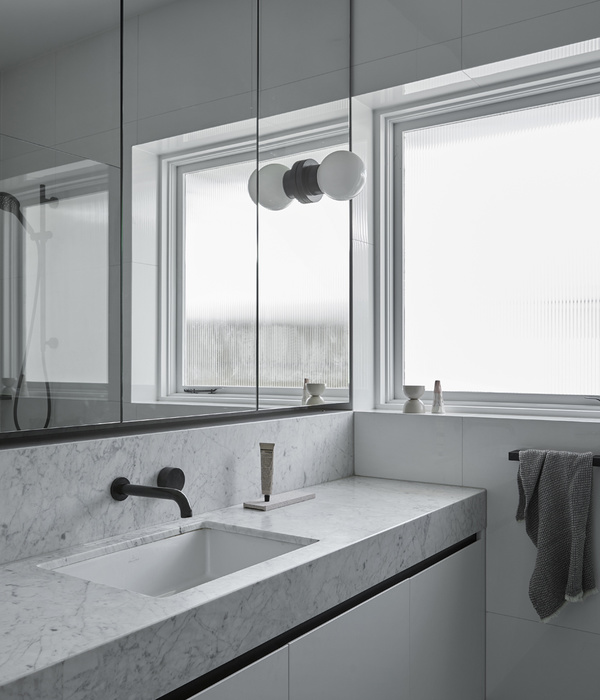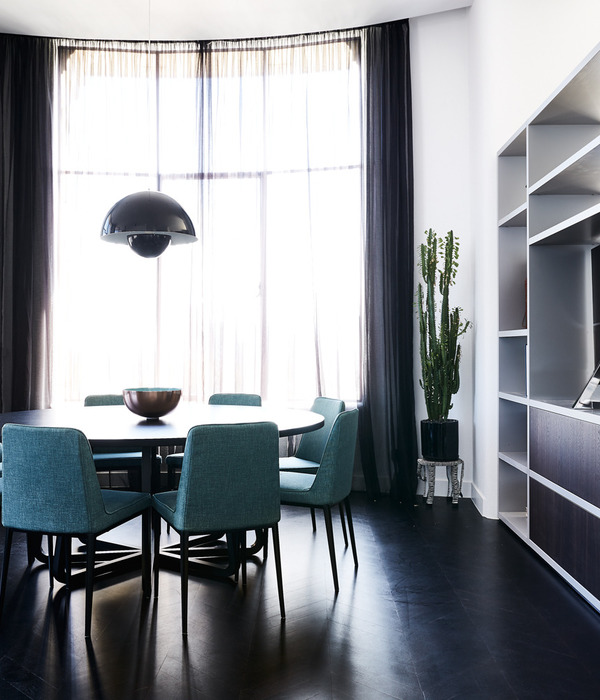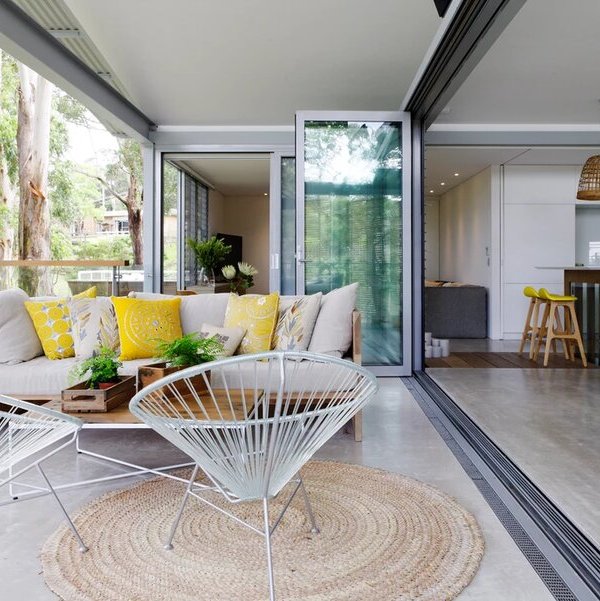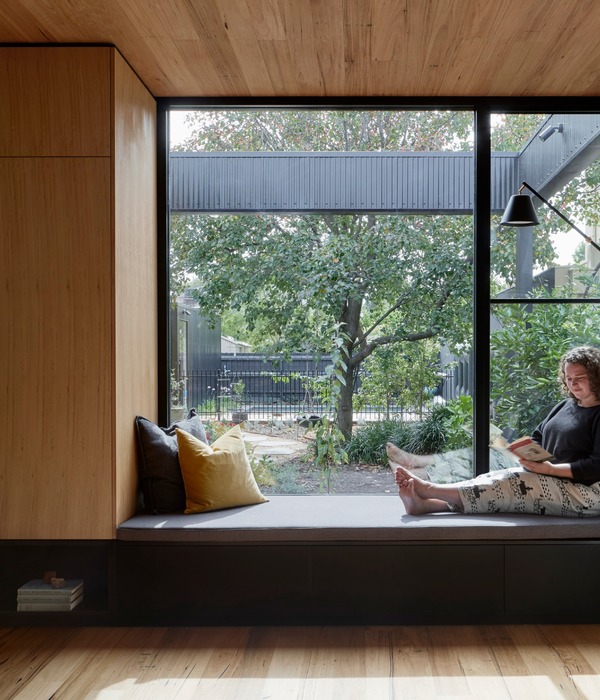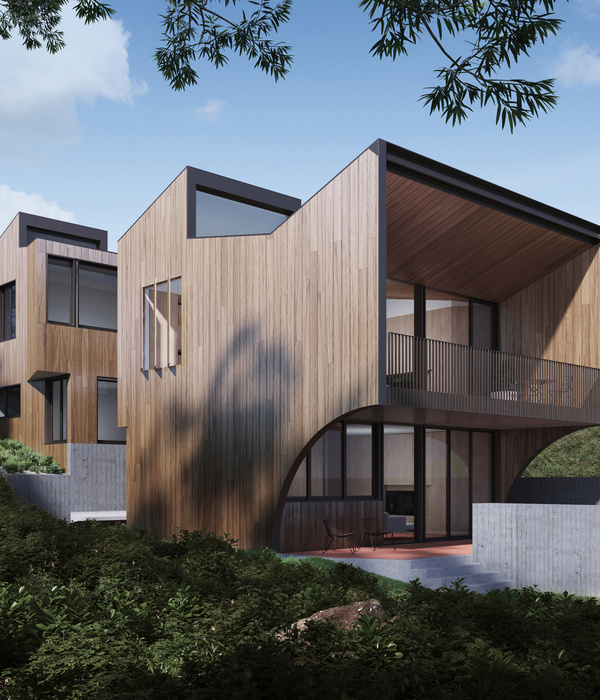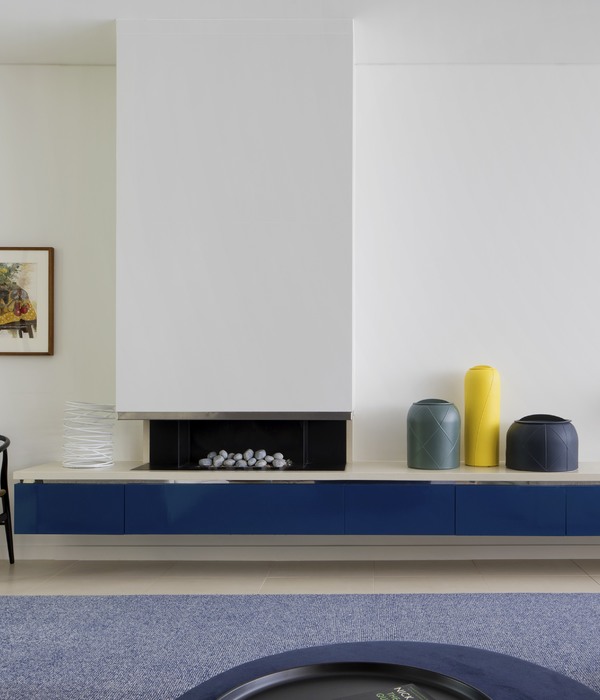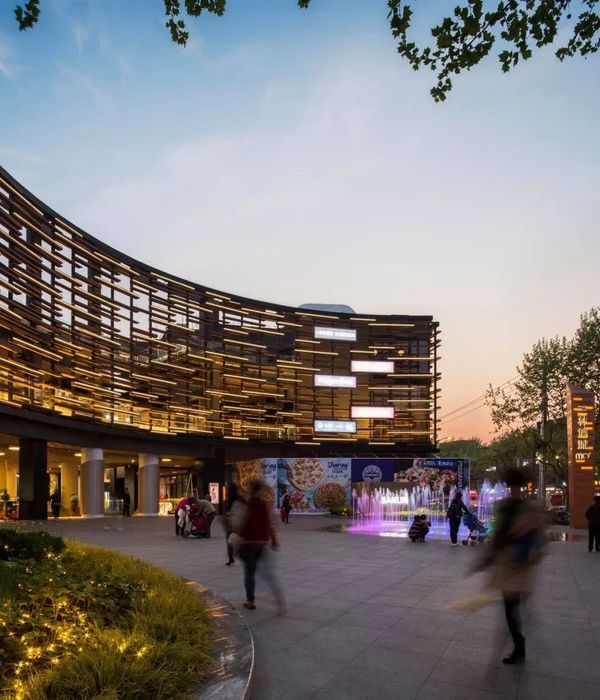架构师提供的文本描述。Zabrze的“Luiza女王”矿于1791年开始运作,几乎贯穿了它的整个存在(直到1998年,它被认为是欧洲最大和最现代化的矿井之一)。作为一家国营矿山,它受益于政府的高额补贴,这不仅在生产领域造成了大量投资。这种发展的一个例子是建造了一座建于1890年的矿井浴室。Łaź尼亚是上西里西亚矿业第一次这样的实施,也是社会设施水平的最好证明,它远远超过了当时的标准。一座宏伟的砖砌建筑,高10米,位于城市主要街道附近,是Zabrze这部分建筑的特色之一。该物体保持原有的主要房间划分、结构部件和部分原始设备。
Text description provided by the architects. The "Queen Luiza" mine in Zabrze began operating in 1791 and practically throughout its entire existence, ie until 1998, it was considered one of the largest and most modern in Europe. Being a state mine, it benefited from high government subsidies, which resulted in large investments not only in the sphere of production. An example of such development was the construction of a mine bathhouse, which was erected in 1890. Łaźnia was the first such implementation in Upper Silesian mining and was the best testimony to the level of the social facility, which was far ahead of the standards of that time. A magnificent, brick building with a basilica layout, 10 m high, located just off the main street of the city, is a characteristic feature of the architecture of this part of Zabrze. The object maintained the original division of the main rooms, structural elements and part of the original equipment.
© Tomasz Zakrzewski
c.Tomasz Zakrzewski
目前,振兴后的建筑将发挥旅游功能(处理游客的交通)、美食(餐厅)和文化功能。它被指定为路易莎皇后矿区未来旅游路线的第一要素。游客们正是从连锁浴池的视野中开始探索这座建筑群的,它的吸引力是主要的遗产鹭。此外,建筑内部是举办展览和文化活动的绝佳空间。由于适应了新的功能,该博物馆有可能在Łaź尼亚举办各种临时展览、春季音乐会、戏剧表演和其他文化活动。
At present, the revitalized building will perform tourist functions (handling visitors' traffic), gastronomic (restaurant) and cultural functions. It was designated as the first element of the future tourist route in the Queen Luiza Mine complex. It is from the sight of the chain bath that the tourists will start exploring the complex with its attraction, ie the Main Key Heritage Herons. In addition, the interior of the building is an excellent space for organizing exhibition and cultural activities. Thanks to its adaptation to new functions, the Museum has the possibility to organize various temporary exhibitions, vernissages, concerts, theater performances and other cultural events in Łaźnia.
© Tomasz Zakrzewski
c.Tomasz Zakrzewski
Floor Plan
© Tomasz Zakrzewski
c.Tomasz Zakrzewski
作为振兴工作的一部分,对前连锁浴室的建筑进行了彻底翻修。建筑物的砖外墙被清洁,砖结构得到加强,空腔被用一个颜色协调的砖来补充,并且按照保护建议的尺寸。新设计的党在东南部的附件是由砖不同的材料留在历史部分的建筑物。对墙体进行了全面的防潮保温.窗户用相同的多边形铁器代替了铝。外门也是铝,玻璃,多轨,而不是现代,损坏的木和金属.屋顶翻新了,必要时还制造了新的木制品。天线框架的建造需要翻修和部分重建。东侧扩建后,大楼从这里进入正门-从沃尔诺ś慈街进入楼梯,从内部入口和停车场进入残疾人坡道。第二,在沃尔诺ś街一侧的现有入口,人行道上出现了新的外部楼梯。西部支线也得到了重建。建筑物周围的区域接受了小型建筑的元素(长凳、照明)。
As part of the revitalization, the building of the former chain bath has been thoroughly renovated. The brick façades of the building were cleaned, the brick structure was strengthened, cavities were supplemented using a brick that was color-coordinated and dimensionally in accordance with conservation recommendations. The newly designed parties at the south-east annex were made of a bricks different from the material remaining in the historic part of the building. Comprehensive damp-proof insulation of walls was carried out. The windows have been replaced with aluminum with identical polygon ironwork. The outer doors were also aluminum, glazed, multi-track, instead of modern, damaged wooden and metal. The roof was renovated, new wooden parts were made where necessary. The construction of the rafter framing required renovation and partial reconstruction. After the expansion of the eastern extension, the building gained here the main entrance - through the stairs with access from Wolności street and after the ramp for disabled people available from the internal entrance and parking square. At the second, existing entrance from the side of Wolności street, new external stairs appeared on the sidewalk. The western extension was also rebuilt. The area around the building received elements of small architecture (benches, lighting).
© Tomasz Zakrzewski
c.Tomasz Zakrzewski
引进新的博物馆和文化功能需要适当的内部安排。有必要对室内进行隔离(除了房间的墙壁上有淋浴),这导致墙壁被用灰泥表面建造起来。主要的内墙被留下了砖头。在美食部分,建造了一个夹层。石器地板已保存或修复在一个房间,淋浴,在入口前厅,部分在美食部分。维护了铸铁建筑柱.悬挂天花板的使用,然而,他们揭示屋顶桁架结构,部分在内殿。天花板上可见的装饰部分是用淋浴保存下来的。浴室的原有设备被保留了下来。链式更衣室的设计、链条本身和容器挂在上面,带有支撑结构的水箱、淋浴和长凳上的金属元素都被清理干净,旧的油漆层也被移除。损坏和丢失的木制座椅已被重建。
The introduction of new museum and cultural functions required appropriate interior arrangements. There was a need to insulate the interior (except the wall in the room with showers), which resulted in the walls being built up with plaster surfaces. The main internal walls were left as brick. In the gastronomic part a mezzanine was built. Stoneware floors have been preserved or restored in a room with showers, in the entrance vestibule and partly in the gastronomic section. Cast-iron construction pillars were maintained. Suspended ceilings are used however, they reveal roof truss structures partly within the nave. The visible decking of the ceiling was preserved in part with showers. The original equipment of the bathhouse was preserved. The design of the chain locker room, the chains themselves and the containers hung on them, the water tank with the supporting structure, showers and metal elements of the benches were cleaned and old painting layers were removed from them. Damaged and missing wooden seats have been recreated.
© Tomasz Zakrzewski
c.Tomasz Zakrzewski
波兰煤矿唯一具有历史意义的浴室的振兴,部分维护了原来的设备,并提供给游客,这使得我们能够了解到19世纪末一家大型国有工业工厂的社会状况。
The revitalization of the only historic bathhouse in Polish coal mining, which partly maintained the original equipment and is made available to visitors, allows to learn the social conditions prevailing at the end of the 19th century in a large, state-owned industrial plant.
浴室是游客在扎布尔兹看到整个煤矿综合体的起点。现在它作为展览、活动、戏剧、音乐会的场所。在四月,主要的遗产鹭应该为地下游船做好准备。
The bathhouse serves as the starting point for tourist who will see the whole complex of coal mines in Zabrze. Right now it functions as a place for exhibitions, events, theater plays, concerts. In April the whole Main Key Heritage Herons should be ready for underground boat tours.
© Tomasz Zakrzewski
c.Tomasz Zakrzewski
产品说明:
Product Description:
在这个项目中最重要的事情之一是满足所有的要求,因为fas的隔热是有关的,同时保持砖的外观没有任何改变。解决方法是采用YTU多功能块作为内绝缘。将白色漆成白色有助于实现建筑物内的“白盒”效果,与砖墙正面形成对比,并为展览空间提出了合乎逻辑的建议。
One of the most important things in this project was to fulfill all the demands as fas as thermal insulation is concerned while keeping the brick facades without any changes. The solution was to use the ytong multipor blocks as inner insulation. Painted white it helped to achieve “the white box” effect inside the building, as a contrast to brick facades and a logical proposal for exhibition space.
{{item.text_origin}}

